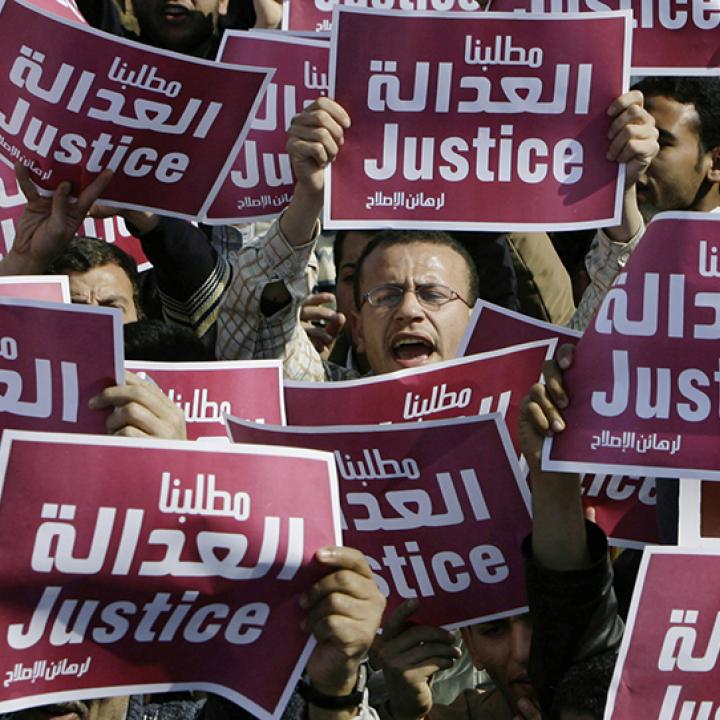
- Policy Analysis
- Policy Alert
Egypt-Turkey Rapprochement Is Constraining the Muslim Brotherhood

Recent understandings between Cairo and Ankara have many of the group’s exiled figures worried about their future on Turkish soil.
On March 19, AP reported that “Turkish authorities have asked three Istanbul-based Egyptian opposition TV channels to soften their critical political coverage of Egypt’s government, as Turkey seeks to repair frayed ties with Cairo.” This was confirmed during an Al Jazeera interview with exiled Egyptian political figure Ayman Nour, head of El Sharq TV—one of the three targeted channels along with Mekameleen and Watan, and known to be linked with the Muslim Brotherhood (MB). Egyptian information minister Osama Heikal welcomed the move, characterizing it as a starting point to resolve disagreements that have arisen with Ankara in the past few years.
Why Is Turkey Pressuring the MB Now?
After the Egyptian military overthrew Mohamed Morsi’s MB-led government in 2013, Turkey became a haven for many key opposition figures, allowing them to launch television channels that criticized Morsi’s replacement, current president Abdul Fattah al-Sisi. Members of this exiled media community reportedly number around 500, though they are hardly well-unified; in 2018, constant infighting and lawsuits led to the formation of the Egyptian Media Association Abroad to resolve their internal disputes.
The two most prominent channels are El Sharq and Mekameleen, due largely to the popularity of their top non-Islamist media personalities, Moataz Matar and Mohamed Nasser, respectively. On multiple occasions, Sisi has referred to these commentators as “evil people” because of their constant inflammatory rhetoric against his government.
Over the past couple years, Ankara gradually became convinced that this fragmented MB opposition-in-exile was a losing horse that could no longer be used to intimidate Sisi, particularly following the ineffective string of small protests fomented in Egypt by exiled contractor Mohamed Ali in 2019. Moreover, the two countries have recently begun to develop mutual understandings on key regional issues. For example, when Cairo opened bidding for oil and natural gas projects in twenty-four blocks this February, Turkish foreign minister Mevlut Cavusoglu praised Egypt for respecting his country’s continental shelf parameters, according to a recent Reuters report. And when Cairo hosted the first ministerial meeting of the East Mediterranean Gas Forum earlier this month, no statements were issued criticizing Turkey. Ankara also appreciates Egypt’s policy shift on Libya—namely, away from the aggressive approach pursued by the United Arab Emirates.
Change in MB Rhetoric
Top opposition media figures have generally refrained from criticizing Turkey for these moves, instead depicting them as understandable. Some commentators have even reaffirmed their gratitude to Ankara for giving them a platform over the years despite constant pressures from Egypt and certain Gulf countries strongly opposed to the MB. As Mohamed Nasser stated during a March 21 interview with Al Jazeera, their message will remain the same, but they are willing to express it more indirectly to avoid embarrassing their host country.
At the same time, some voices within the MB political structure have begun calling for dialogue with the Egyptian government. In doing so, they have set aside their past demand that Sisi release all prisoners and admit he took power illegitimately in 2013, instead simply asking authorities to ease the situation for political detainees. In a March 20 interview, acting general guide Ibrahim Munir stated that the MB is willing to communicate with the government through a Turkish mediator in order to resolve what he called “disputed matters,” without using the word “coup.”
Other MB elements oppose this stance, however, insisting that the organization continue challenging the government’s international legitimacy and demanding the release of all prisoners. This camp consists of high-ranking figures such as Hamza Zawba, former spokesman of the Freedom and Justice Party, alongside mid-ranking members who are accused of terrorism offenses and have therefore lost hope of returning to Egypt without going to jail. Meanwhile, unverified reports by the Saudi-owned media outlet Al-Arabiya indicate that Turkey has stopped the process of granting citizenship to Yahya Musa and Alaa al-Samahi, two U.S.-designated terrorists implicated in the 2015 assassination of Egyptian prosecutor-general Hisham Barakat.
Where Will the MB Go Now?
Muslim Brotherhood media options are becoming more limited, and exiled members tend to believe that Ankara will no longer be so flexible about allowing them to resume their past inflammatory discourse. Hence, many of them are unlikely to stay in Turkey much longer, and some prominent departures may be witnessed in the coming months, especially among individuals with significant wealth or political connections elsewhere. They might be out of regional options, however—even maverick Qatar seems like an uncertain destination for high-profile figures given its track record of kicking out their peers. This means they may head for the United States, Canada, or Britain, as Nasser mentioned during his recent Al Jazeera interview.
In contrast, low- and mid-ranking members will likely suffer the most, since many of them have expired Egyptian passports and are living in Turkey on one-year visas. In online discussions, they have proposed destinations such as Qatar, Malaysia, and certain European capitals. One MB journalist even grew desperate enough to seek out a previously unthinkable alternative as early as 2018: exploring career opportunities with Israeli Arabic-language news channels at a conference in Tel Aviv.
For its part, the pro-government camp in Egypt has been celebrating the opposition’s growing difficulties. Sympathetic media outlets emphasize these problems not only to highlight Sisi’s success in containing the MB, but also as a message to other opposition elements remaining inside Egypt. Indeed, Cairo seems uninterested in welcoming opposition elements to return home, seeing most of them as a potential source of pressure on human rights issues. But the government will still pursue those accused of terrorism offenses.
Haisam Hassanein is a Middle East analyst and a former Glazer Fellow with The Washington Institute.



